国际商务贸易合同课件英文版
商务合同英文版.pptx

Ⅰ:The negotiation and conclusion of the Sales Contract
Ⅱ: The fulfillment of sales contract
Ⅰ:The negotiation and conclusion of the Sales Contract
1.The contents of business negotiation Including Commodity, quality, quantity, unit price, total value, shipment, term of payment, packing ,marking and Nos., insurance, claims, force majeure, arbitration and so on
3) Counter-offer
例:前面所举的运动衫发盘的受盘人根据发盘作 出如下还盘:
Your cable 10th counter offer USD 70 per dozen CIF NEW YORK, May shipment D/P 30 days 原发盘人再作还盘:
Your cable 12th lowest price USD 75 per dozen CIF NEW YORK, May shipment irrevocable sight L/C
包销合同
■ Custodian contract
保管合同
2. Labour Service:
■ Engineering Contract
工程承包合同
■ Project Cooperation Contract 工程合作合同
■ Labor Cooperation Contract 劳务合作合同
国际贸易英语pptPPT课件

Other trade terms
Other trade terms include CFR (Cost and Freight), CIP (Carriage and Insurance Paid), CPT (Carriage Paid To), and so on. These terms also have certain applications in international trade, and their obligations and risk allocation for both buyers and sellers are similar to the above three trade terms, but the specific operating procedures and cost sharing are different.
The Importance of International Trade
Summary words: Classified by product form, transaction method, and transaction nature
Classification of International Trade
Certificate of Origin
Summary: A certificate of origin is an official document that proves the origin of goods, used to prove whether the value, taxes, etc. of the goods meet the requirements of the importing country.
国际商务谈判英文版课件
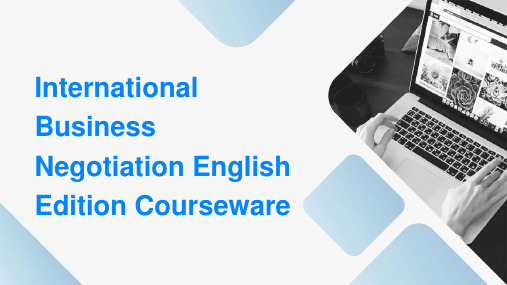
Paying attention to body language, legal expressions, and tone of voice can provide additional information
Non verbal communication
Repeating or summarizing what the other party has said can ensure that you have understanding their points correctly
Cultural factors in international business negotiations
04
Body language
Non verbal cues such as factual expressions, posts, and styles can convey messages that are just as important as what is said verbally
01
Course objectives
This course aims to provide students with the knowledge and skills necessary for effective international business negotiations
Course structure
Mediation
If necessary, a neutral third party can help resolve conflicts by facilitating communication and bridging cultural divisions
国际商务谈判英文版PPT-9 . International BuyingSelling Negotiations

9.2 EFFECTS OF GLOBALISATION
9.2.3 MNEs and international selling
• In multinational MNEs
– Each overseas subsidiary is usually decentralised and bec omes nationally self-sufficient
ween the parties – the national law under which the agreement will be int
erpreted
9.2 EFFECTS OF GLOBALISATION
9.2.6 Licensing agreements
• A licensing agreement may be a simple patent li cence or a production or process technology lic ence
9.2.3 MNEs and international selling
• Generic strategies which may give an MNE co mpetitive advantage both in developing and de veloped markets are – cost leadership – niche operations – market differentiation
• In global MNEs
– little account is taken of national differences – typically integrate local activities into worldwide operat
Chapter 3国际商务合同的结构《国际商务合同双语》PPT课件

则之间的关系是什么?
• (2)导致本案判决结果的关键事实是什么?
合同的前言
3.1 Preamble of a Contract
3.1 Preamble of a Contract 合同的前言
• A preamble is a preliminary statement to introduce the general reasoning of an agreement, the principle of reaching an agreement, or the scope of authority. It usually includes the title, and number of the contract, the date and place of signing the contract, the names and addresses of both parties and the preface or recitals, etc.
operational clause
3.2 Main Body of a Contract 合同的正文
• General clauses includes the following:①Definition clause;②
representations and warranties Clause;③indemnification/hold harmless clause;④confidentiality clause;⑤term and termination clause;⑥assignment and modification clause;
Chapter 1国际商务合同的基础知识《国际商务合同双语》PPT课件
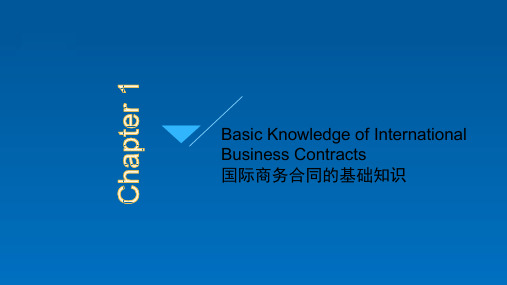
Guide Case Selling Water for China
• 2. The Scene
• These negotiations concerned an urban water supply system providing potable water to around one million people. Through an agent in the province, the China subsidiary PAQ had secured a contract to construct a water treatment plant for the system.
Guide Case Selling Water for China
• 2. The Scene
• Some time after the completion and commissioning of the plant, PAQ learned from the same agent that the municipality was short of funds for some urgent development projects. One of its options was to privatize the municipality’s water supply facilities.
Basic Knowledge of International
Business Contracts 国际商务合同的基础知识
Guide Case Selling Water for China
• 1. Case Story • Overview:Acqua International(AQ)is a Europe⁃based
国际贸易实务双语课件chapter three
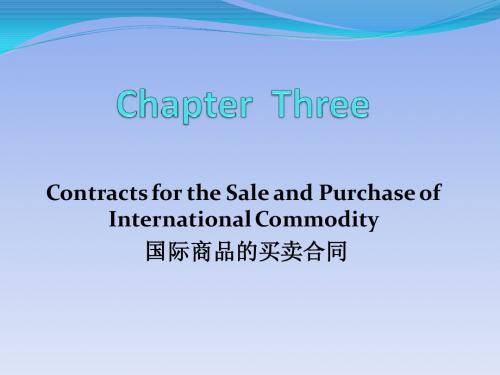
Section Two Formation of Contract 合同的格式
A business contract is an agreement, enforceable by law. It may be formal or informal. The business contract which is generally adopted in international trade activities is the formal written one. Generally speaking, the business contract is usually made up of 3 parts, i.e., the preamble, the body and the witness clause. 贸易合同是一份具有法律效力的协议书。它可以是正 式的也可以是非正式的,一般来说,一份正式的合同 通常由约首、约文和约尾三部分组成。
Contracts for the Sale and Purchase of International Commodity 国际商品的买卖合同
Section One Definition of the Contract (合同的定义)
A contract is an agreement between two or more competent parties in which an offer is made and accepted, and each party benefits. 国际货物买卖合同是指营业地处于不同国家或地区的当 事人之间所订立的货物买卖契约,合同双方都可受益。
合同的三部分
约首:通常包括合同名称、合同号码、缔约日期、缔 约当事人、缔约地点、当事人的合法依据、缔约缘等 约文:通常包括定义条款、一般条款、基本条款、有效 期、终止、让与、不可抗力、适用的法律、仲裁、诉 讼管辖、通知手续、完整条款、修改等 约尾:通常包括文字的效力,份数,见证人,附件,当 事人签证,盖印等
国际商务谈判英文版PPT-1. International Business Negotiation
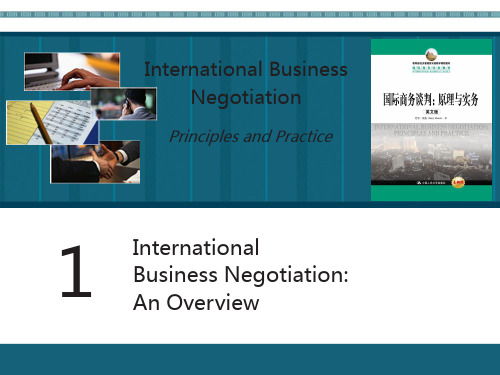
1.1 Introduction
• International business
– economic activities economic activities across national boundaries
• International business negotiation
– not a monolithic activity – involves cooperative exchanges of information
1.3 Scope
1.3.3 Government involvement
– government plays an important role in some negotiations either as a participant or as a regulator
1.4 Different Type s
and offers between the parties
give and take, trade-off
– micro-level vs. macro-level – Involves the laws of two or more countries
1.2 Communication
1.2.1 Communication technologies
国际贸易合同中英文版本
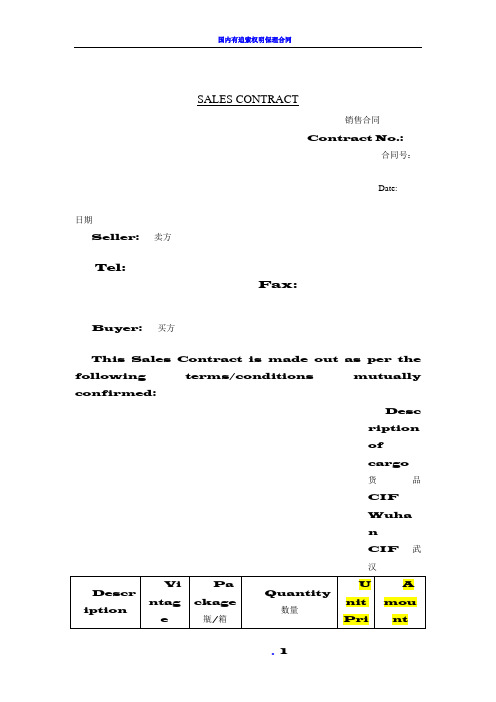
SALES CONTRACT销售合同Contract No.:合同号:Date:日期Seller: 卖方Tel:Fax:Buyer:买方This Sales Contract is made out as per the following terms/conditions mutually confirmed:Descriptionofcargo货品CIFWuhanCIF 武汉NOTE: 1. Thermal blanket is necessary for drycontainer at any time during a year. Otherwise the Buyer has the right to return the cargo or refuse the payment for cargos influenced by hot temperature.干柜在一年中的任何时候都需隔热层,否则买方有权退回货物或拒绝为因高温造成影响的货物付款。
2. Insurance: To be effected by the sellerfor 110% of full invoice value covering marine institute cargo clauses All Risks.保险:由卖方按发票全额的110%购买涉及海洋协会货物保险条款“一切险”3. Time of Shipment: Partial shipment is not allowed.发货时间:7月15日之前,不允许分批装运。
4. Port of Shipment: Livorno装运港:利沃诺5. Port of Destination: Wuhan, China.目的港:中国武汉6. Time of arrival at the destination port:到达时间:9月1日前抵达目的港。
7. Terms of Payment: T/T 90 days afterB/L date付款时间:提单日期后90天电汇8. Documents: The Seller shall present the following documents to the Buyer as required:卖方需提供买方所需的以下文件:1)Full set of negotiable clean on boardocean Master’s Bill of Lading indicating shipping mark, blank endorsed, and notifying the Buyer with full name and address at the port of destination.全套清洁提单2)Signed Commercial Invoice in THREEoriginals showing this Contract number, and the Shipping Mark. If the Seller is not the direct producer for any of the oils, the actual oil producer’s name and the invoice number between the Seller and the producer should be indicated in the required invoice.商业发票3)Packing List in THREE originals,showing this Contract number, gross and net weights, and quantity of cartons & bottles for each container.装箱单4)Certificate of Origin issued by Chamberof Commerce, in ONE original and ONE copy, showing each oil’s appellation.原产地证5)Certificate of Sanitary and Purity,issued by government department, to state the inspection results, in conformity with French rules, in ONE original and TWO copies.卫生证书6)Analysis report for each oil in ONE original and TWO copies.分析报告7)Declaration of no-wood Packing Material to China Entry & Exit Inspection and Quarantine if there is no wooden packing material. If wooden pallets or cases are used, there must be fumigation Mark like “IPPC” or “NIMP15” on the wooden pallets or cases, and better accompany with a relevant fumigation certificate.无木质包装声明8)Declaration of bottling date for each oil with the form of "YEAR-MONTH-DATE"灌装日期9)10% of the total bottle quantity of original copies of Front Labels and Back Labels for each oil, Min 20 sets. 前后标10)Two original of this Contract.合同11)One certificate issued by local chamber of commerce to prove the reality of the cargo value, indicating the contract No.厂商声明12)One copy of the Insurance Policy保单13)One copy of the transportation invoice from the forwarder运输发票14)One copy of export declaration which can show the export value of the oils显示货物出口值的出口报关单9. Cargo pre-check: After the production but before the loading of the cargo, the seller should take pictures of each type of oil which can clearly see the content of front and back labels for pre-check. Any cost or loss should be burden by the seller if the seller doesn’t send the pictures for pre-check.货物预检查:生产后,装运前的货物,卖方应为每个产品品项拍照,照片可以清楚地看到正面和背面标签作为预检查的内容。
国际贸易合同英文课件

international commercial contract国际贸易合同foreword1. The main work of intern ati onal trade:Two directi ons:(1) enterprise -- marketBusin ess work:①know the market②tran sfer in formatio n to manu facturer③promoti on④n egotiatio n⑤draft-modify-sig n the con tract⑥perform the con tract⑦deal with problems aris ing from the bus in ess: become partner; settle disputes(2) market --- e n terpriseBusin ess work:①Know the commodity, en terprise, dema nds②n egotiati on and sig n the con tract③manu facture and perform④cooperate or settle disputessummaryCon tract is a part of intern atio nal bus in ess.2. Brief in troduct ion to this coursePeriod: 36 hoursCredit: 2Characteristics: special and elective course3. C on tributi ons to your work in the futuredraft ,edit, in terpret con tractsCase:PI, PROFORMA INVOICE4. con te nts(1) Basic kno wledge of con tracts (emphases):Con cept, prin ciple, developme nt, structure, writi ng, in terpretati on, expla nati on(2) The law of con tract(3) Some kinds of con tracts (emphases)5. Teach ing material for reference参考教材:《国际商事合同制作原理》立新会计出版社,龚柏华主编;主要辅助教材:《英文合同书制作方法与法理》外文出版社,岩崎一生著;《国际贸易条款及案例》对外经贸大学出版社,黎孝先主编;《英汉经贸合同精选》对外经贸大学出版社,李俊主编;《国际贸易合同》民主法制出版社,来奇主编6. The mai n requestsCan draft, edit and tran slate main con tracts of intern ati onal bus in ess accurately ;Need your patie nee and carefu In essChapter 1 the in troduct ionSectionl con cept1. c on tract(1) defi niti on①《con tract law of PRC》:an agreeme nt that establish, modify and termi nate the civil rights and obligati ons betwee n subjects of equal footi ng, that is betwee n n atural pers on s, legal pers ons or other orga ni zati ons.②《law dictionary》by Steven Gifts:Con tract is a promise, or a set of promise, for breach of which the law gives remedy, or the performa nee of which the law in some way recog nize as a duty.From com mon law system③《a dictio nary of law》 by LB.curz on: con tract is a legally bin di ng agreeme ntFrom continen tal law system(2) Disti nguish con tract , agreeme nt and treatyCon tract: with legal force, formal;Agreeme nt: more broader, might lack some esse ntial eleme nts of a con tract;Treaty:条约(3) esse ntial clausesLB.curz on:Offer and absolute and unq ualified accepta neeConsen sus ad idemInten ti on to create legal relati onsGenuinen ess of consentCon tractual capacity of the partiesLegality of objectPossibility of performa neeCerta inty of termsValuable con siderati on(4) Certa inty of terms《contract law of PRC》:Title or n ame and domicile of the parties;Con tract object;Quan tity;Quality;Price or remun erati onTime limit, place and method of performa nee; Liability for breach of con tract;Methods to settle disputes2. Ki nds of intern ati onal commercial con tracts intern ati onal con tracts for sale of goods; (ICC Model, model of sino-Japa nese)intern ati onal con tracts for sales age ncy; (ICC Model)Distributorship con tract; (ICC Model)Intern ati onal fran chis ing con tract; (ICC Model)Process ing, compe nsatio n, lice nee, lease, labor, joint ven ture, joint cooperati on, in sura nee, tran sportati on, con sultatio n, cooperati on, loan, con sig nment, etc.Section2 basic prin ciplesbasic prin ciples of con tractl. freedomCon-case:fraud, threat, misun dersta nding.2. good faith and fair deali ng;3. pacta sunt serva nda:[lati n] for pacts must be respected4. abide by the law (ma ndatory rules prevail)5. respect usages and practicesSection3 developme nt1. The assimilati on of the legal criteri on(1) i ntern ati onal treatiesGoods;Tech no logy;In vestme nt;Finance.(2) intern ati onal customsIn coterms2000, ucp500, etc.⑶ in ternatio nal model law (PICC)2. The sta ndardizati on of the text(1) intern atio nal orga ni zati onICC: goods sale, age ncy, distributorship, fran chise, occasi onal in termediary, non-disclosure agreeme ntECE: ECONOMIC COMMISSION FOR EUROPECorn, complete plant 成套设备 and durable consumer goods 耐用消费品(2) the professi onal associatio n:FIDIC con diti ons of con tract for works of civil engin eeri ng con struct ion(3) legal pers ons(4) co un try: sino -Japa nese, Germa ny, South Korea3. Novelty and specializati on;4. the electr onic formati onE-commerceChapter2 structureSection1 non-operative part1. foreword(1) cover: title, parties, date⑵ title:Con tract, agreeme nt, con firmati on, order, memora ndum(3) nu mber(4) date: effective date, sig n date(5) place: gover ning law, stamp duty(6) the corporate or pers onal n ameFull n ame for the first time, repeat for short; law(7) address:Legal address, registered address, prin cipal bus in ess office2. Expla nati on clause(1) whereas clause⑵ recitals:Backgro und, prin ciple, legalitySection2 body (operative part)Structure:Article (chapter);Section, sub-secti on;Paragraph, sub- ParagraphOr 1, 1.1, 1.1.1 ……1. Assistme nt clause(1) defi niti on: special meaning(2) durati on: the date coming into force, the durati on(3) no tice: time, form, la nguage, conten ts, manner(4) term in atio n: by stipulati on, by n egotiati on, by law(5) the esse nee clauseCommon law: breach be con sidered as a material breach;Con ti nen tal law: exte nd a time limit(6) merger clause(7) headi ng has no legal force, only for brief2.Settleme nt clause(1) assig nmentRights, obligati ons, all together(2) ame ndme ntsMutual consent, by special form(3) force majeureDefin iti on, reas on, timely no tice and attest, aftereffect(4) hardship3. Disputes resolutio n clauses(1) choice of lawSuit: con tact with con tract (some coun tries)Arbitrati on: choose from any coun try, excepti on: man datory rules prevail(2) Arbitratio n and mediatio n clauseConsent, scope, place, orga ni zati on, rule and procedure, writte n agreeme nt, award, fee Section3 final clause1. copy, la nguage, validity2. wit ness clause3. testim onium: sig n and seal4. conditions of effectiveness: after the sig nature, after approval5. a nn exes, appe ndices, schedules, exhibitsChapter3 the Ian guageSection1 the characteristics of the Ian guage of con tractProfessi on al, formal, accurate;Accuracy, brevity, clarity1. Accuracy(1) avoid ambiguity (more tha n two meanin gs)(2) repeat of words(3) use ancient words(4) use Lati n words(1) avoid ambiguityCase:Red ball-pe n;Time: in, bim on thly, biweekly and othersAn d/or(2) repeat of wordsRepeat is com monAdverb:here-, thisthere-, thatwhere-, what or whichFun cti on: replace and restrictSuch as:hereafter, here in, here in after, hereof, hereto, here un der, hereup on; Thereafter, thereof, there in, therewith;When soever, whereat, whereby, wherefore, wherei n, whereof, where on(3) use ancient words, p29Aforeme nti onedAforesaidForthwithHen ceforth: from now onPursua nt toThenceIn wit ness whereof(4) use Lati n wordsP29-p30①Ab ini tio:从一开始;Ab in itio calculati on②Ad hoc:特别的,仅为某一目的的;非事先计划的,非正式的FBI appo ints an ad hoc royal trump-killer to give the goat a death-blow;Ad hoc speech③bona fide: good faith 善意的,真正的。
- 1、下载文档前请自行甄别文档内容的完整性,平台不提供额外的编辑、内容补充、找答案等附加服务。
- 2、"仅部分预览"的文档,不可在线预览部分如存在完整性等问题,可反馈申请退款(可完整预览的文档不适用该条件!)。
- 3、如文档侵犯您的权益,请联系客服反馈,我们会尽快为您处理(人工客服工作时间:9:00-18:30)。
▪ After A Few Years Of Non Payment Phase 2 Was Abandoned And Phase 1 Was Shut Down. The Plant Is Currently Inactive. It Would Have Been The World’s Largest Private Gas-powered Power Plant.
Enron Questions
▪ What went wrong from a contract negotiation standpoint?
▪ How could things be done differently? ▪ How useful was international arbitration?
▪ The Government Asked For The World Bank To Review The Deal
▪ World Bank Questioned The Economic Viability Of The Deal
▪ Said It Was Very One-sided In Favour Of Enron
▪ The Central Government approved the project in Early 1993 and applied for World Bank Financing.
▪ The World Bank rejected the financing, saying the project was economically unviable
‘BT’ in India Continued
▪ After The Cable Was Built, The Government Of India (GOI) Announced A Scheme Of Liberalisation Where LDMI No Longer Had A Monopoly. They Had To Allow Other Carriers To Enter India Using Their Network And Landing Station (For A Price)
BS7312 International Business Environment & Trade
Two Personal Case Studies Involving International Contracts
21 February 2018
Peter Martins da Silva
Both Cases Relate to My Experience in the Submarine Cable Industry…
Enron Dabhol History Continued
▪ Enron submitted a detailed proposal in December 1992 for a $3.1 B investment
▪ The government scaled back the project to $2.65B and Enron Agreed.
▪ There Argument Was: “It’s In The Agreement, If You Don’t Like It, Sue Us.”
What Should BT Do?
ห้องสมุดไป่ตู้
Another Case Involving International Arbitration
Enron’s Dabhol Project
▪ After Less Than A Year In Operation, The State Government Was Behind In Payments For The Electricity.
▪ Rates Were Much Higher Than The Government-provided Rates ▪ Rates Were Same Even If The Capacity Wasn’t All Used ▪ Rates Were Denominated In US$, Protecting Enron Against
▪ In June 1992 During A Indian Government Roadshow Enron Was Invited To Bid For A Power Generation Project In The State Of Maharashtra
▪ Enron Reviewed Sites In Maharashtra And Entered Into Discussions With Central Government. The Site Selected Was 150km South Of Mumbai.
Bermuda Telecom (BT) In India
(Names Disguised) ▪ Bermuda Telecom Landed A Submarine Cable In Mumbai ▪ Bt’s Landing Partner Is The State-owned Long Distance Monopoly In India (LDMI) ▪ As Part Of The Multi-party Landing Agreement LDMI Paid BT $36 Million To Buy A Small Portion Of Capacity On The Cable. At The Time LDMI Had A Monopoly On Long-distance Traffic In And Out Of India.
▪ The Central Electricity Authority (CEA) gave provisional approval, despite concerns.
▪ The State of Maharashtra took CEA’s approval as final clearance and signed in November 1993 official 20-year agreement with Enron to build plant and supply power at agreed prices. Essentially the Electricity Board would pay a minimum of $220 million a year over 20 years.
▪ Enron Argued Case Via The International Court Of Arbitration In Paris, As Provided For In The Agreement, And The Court Ruled In Enron’s Favour.
▪ After Ruling, Agreement Was Reinstated (With Modifications) And The Power Plant Was Constructed, With The First Phase Completed In 1999.
▪ In 1994 after further review of the contract conditions the State of Maharashtra rescinded the agreement.
Enron Dabhol Continued
▪ Enron And Its Project Partner, Bechtel, Sued The State Government. Also Put Intense Pressure Via The US State And Commerce Departments Over An 18 Month Period.
Enron’s Indian Power Project in Dabhol
▪ In 1992 During A Period Of Economic Liberalization The Congress Party-led Government Announced It Would Open Power Sector To Foreign Investment
▪ We Had Many Carrier Customers Who Wanted To Get Access Into India. We Also Knew Many Indian Software Houses Who Wanted Overseas Access. We Wanted To Connect Them Together But LDMI Wouldn’t Let Us, Even Though The Government Decreed That They Should.
▪ Five Days Later Enron And The Government Signed An MOU. Total Value Of The Project Was $3B The Largest Contract In India.
▪ Soon After, Criticism Started In The Press And In Government Circles About The Hastiness Of The Deal
▪ LDMI’s Argument Was That We Had An ‘Exclusive’ Agreement With Them.
▪ This Was Not True. Our Multi-party Agreement Was The Same For All Landing Partners. In Those Countries Where The Markets Opened Up, The Landing Partner Had To Allow Access.
